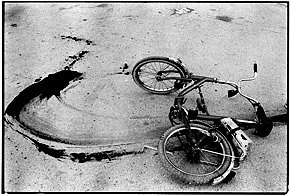Memory day...
a war
through the eyes of
a 12 year old
through the eyes of
a 12 year old
 In Tuzla, the biggest city north of Sarajevo, I saw a bike. Completely crushed. Probably by a tank. Probably with its rider. The old, rusty stain dragged down the road for several meters. That's why I'm spening much of today on my back porch admiring three old bikes I've rebuilt. Steel and chrome, rusty and pitted, are easier to deal with than mangled flesh. Or mangled memories, for that matter.
In Tuzla, the biggest city north of Sarajevo, I saw a bike. Completely crushed. Probably by a tank. Probably with its rider. The old, rusty stain dragged down the road for several meters. That's why I'm spening much of today on my back porch admiring three old bikes I've rebuilt. Steel and chrome, rusty and pitted, are easier to deal with than mangled flesh. Or mangled memories, for that matter. And I'm reading a book about a war. There are many books, like memories, about war. Some are personal recollections such as Orwell's Homage to Catalonia; or about specific topics like civilian refugees or children. Very few, though, are written by children themselves. Ann Frank's The Diary of a Young Girl is certainly the most well known. But its understandably self-absorbed, teenage voice makes it less a war story than a coming of age story set against the backdrop of a war. What makes these diaries so ominous is that the reader knows Anne's life will soon be cut cruelly short.
And I'm reading a book about a war. There are many books, like memories, about war. Some are personal recollections such as Orwell's Homage to Catalonia; or about specific topics like civilian refugees or children. Very few, though, are written by children themselves. Ann Frank's The Diary of a Young Girl is certainly the most well known. But its understandably self-absorbed, teenage voice makes it less a war story than a coming of age story set against the backdrop of a war. What makes these diaries so ominous is that the reader knows Anne's life will soon be cut cruelly short. The voice of Aleksandar, the 12 year old narrator in How the Soldier Repairs the Gramophone, though equally self-absorbed with growing up, is not hemmed in by the four walls of Anne Frank's temporary attic refuge. When war comes to Višegrad, in eastern Bosnia-Herzegovina, it shells the school, throws horses off the bridge into the river Drina, parks tanks in the apartment courtyard, and breaks down doors. Townspeople are taken away eenymeenyminymoe style. There are no temporary attic or basement refuges in 1991-92. Even magic won't help.
The voice of Aleksandar, the 12 year old narrator in How the Soldier Repairs the Gramophone, though equally self-absorbed with growing up, is not hemmed in by the four walls of Anne Frank's temporary attic refuge. When war comes to Višegrad, in eastern Bosnia-Herzegovina, it shells the school, throws horses off the bridge into the river Drina, parks tanks in the apartment courtyard, and breaks down doors. Townspeople are taken away eenymeenyminymoe style. There are no temporary attic or basement refuges in 1991-92. Even magic won't help. Višegrad is the same town in which Ivo Andrić set his historical novel, The Bridge Over the Drina. Written nearly a century earlier it gained much world fame for the magic of its stories. I believe that this debut novel by Saša Stanišić will gain a similar fame but for its stories of magic. The comparison is no rhetorical flourish. Both authors use the ever present Drina as a metaphor for the stories that flow throughout there respective novels.
Višegrad is the same town in which Ivo Andrić set his historical novel, The Bridge Over the Drina. Written nearly a century earlier it gained much world fame for the magic of its stories. I believe that this debut novel by Saša Stanišić will gain a similar fame but for its stories of magic. The comparison is no rhetorical flourish. Both authors use the ever present Drina as a metaphor for the stories that flow throughout there respective novels. In no mood to merely ape Ivo Andrić's style, Stanišić adds a magical realism most often associated with Latin American authors. But in the end, magic cannot undue the horrifying displacement of war. As he concludes,
In no mood to merely ape Ivo Andrić's style, Stanišić adds a magical realism most often associated with Latin American authors. But in the end, magic cannot undue the horrifying displacement of war. As he concludes,A good story, you'd have said, is like our river Drina: never calm, it doesn't trickle along, it is rough and broad, tributaries flow in to enrich it, it rises above its banks, it bubble and roars, here and there it flows into shallows but then it comes to rapids again, prelude to the depths where there's no splashing. Nut one thing neither the Drina nor the stories can do: there's no going back for any of them.
Labels: history, war stories, writing







0 Comments:
Post a Comment
<< Home